If you’re going out camping, for any reason, you should be able to boil water when required.
You need to purify any that you find while in the field before you drink it, and with the proliferation of freeze-dried camping meals and rations, boiling water is usually required for preparation.
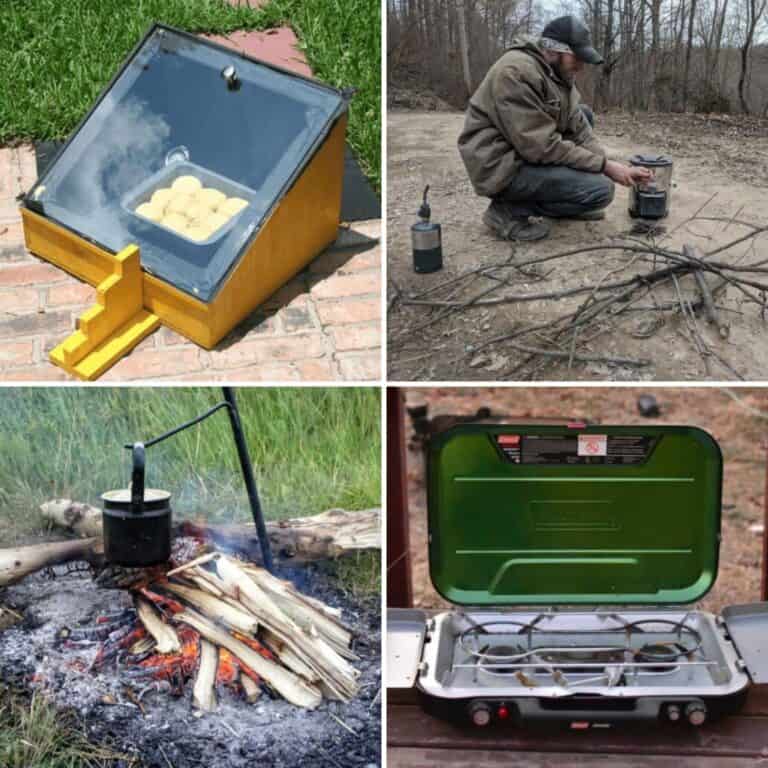
You can always set a kettle or pot over the campfire, that’s one way to do it, but there are lots of other ways besides.
In this article, I’ll tell you about 13 ways to boil water while you’re out camping. Grab your pack and let’s get going…
1. Solar Oven
For those who enjoy leaving no trace and have plenty of time to wait, solar ovens can be a surprisingly effective method for boiling water.
This eco-friendly cooking tool harnesses the limitless power of the sun to heat water, making it an ideal choice for clear, sunny days.
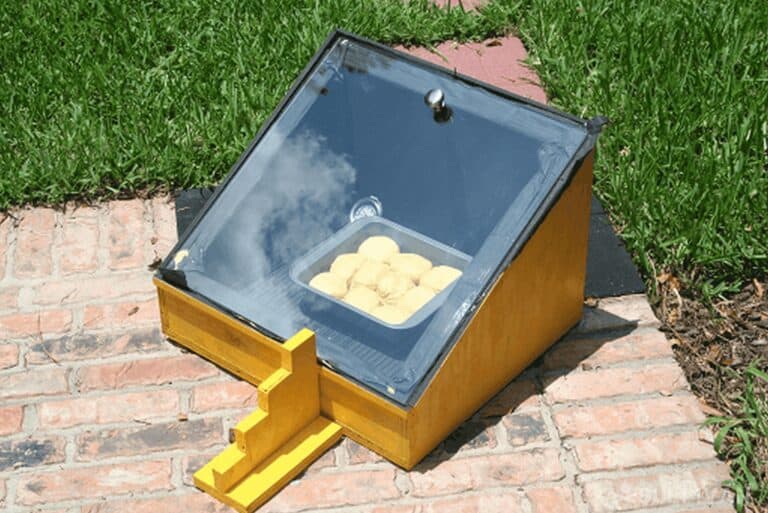
small DIY solar oven with tray of cookies baking inside
However, it’s important to note that in cloudy or non-ideal weather conditions, boiling will take a lot longer- if it is possible at all!
Solar ovens are, naturally, useless at night or under a dense canopy. While some designs aren’t very portable due to their size and weight, there are compact versions available.
But bear in mind, these portable designs often compromise significantly on efficiency, meaning you’ll need more ideal conditions for efficacy.
So, while a solar oven may not be the quickest way to boil your water, they are a viable, fuel-saving alternative.
2. Campfire
Certainly the most time-tested way of boiling water at camp, the campfire is as versatile as it gets when it comes to boiling water while camping.
Whether you’re using a cup, mug, kettle, or pot, a well-tended campfire can provide more than enough necessary heat in any conditions.
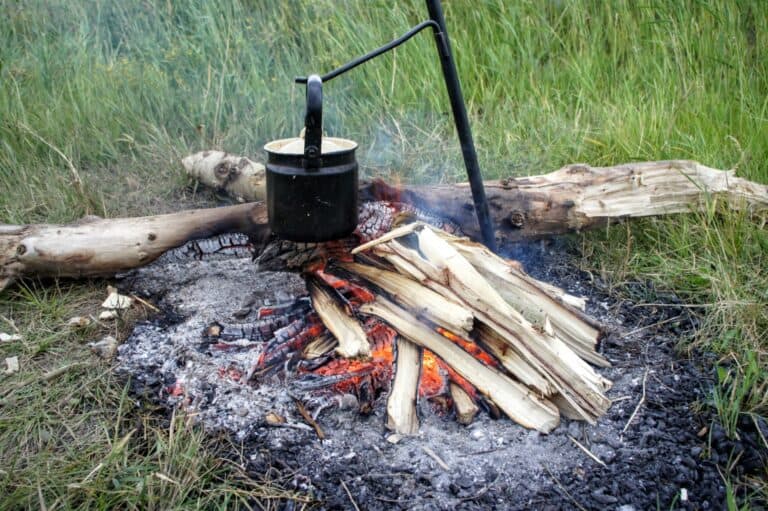
However, a good fire does require a significant amount of fuel and regular tending. This means you’ll need to keep a good supply of wood on hand and constantly monitor your fire.
Despite this, if you’re already using a campfire for heat and light, it becomes the de facto and highly-efficient option for boiling your water.
And as always, the warmth of a crackling fire certainly adds to the overall camping ambiance, so it gets my vote!
3. Camp Stove
When it comes to convenience and speed, a common camp stove is hard to beat. These handy devices are not only easy to carry (usually) due to their compact design, they’re also simple to set up, making them a favorite among most campers, particularly those that are hiking long distances.
If you don’t have a stove you can still boil water, just check our guide on boiling water without a stove for options.
Generally, camp stoves heat water pretty quick, reducing the waiting time for that much-needed cup of coffee or hot meal.
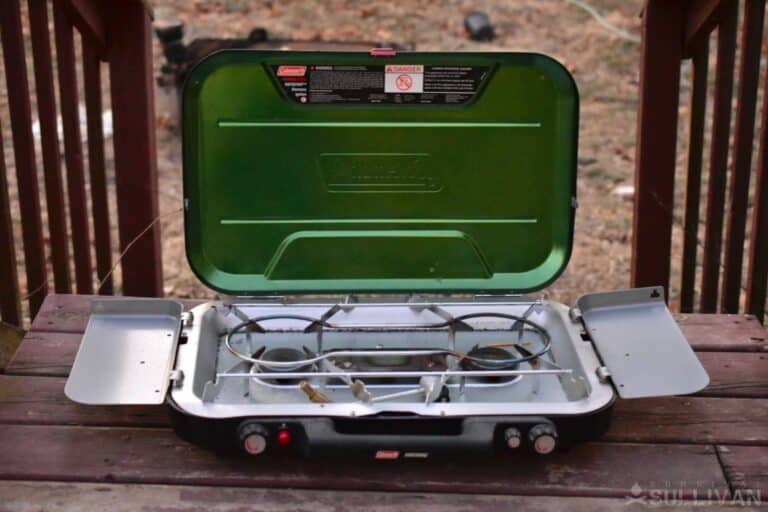
A 2-burner Coleman propane camping stove.
The only hitch is that they require a dedicated fuel canister, which means carrying extra weight and bulk.
However, some models on the market make use natural fuel in the form of twigs, leaves and sticks as fuel, offering a more adaptable and lightweight option.
Despite the need for a specific fuel source, a camp stove’s portability and efficiency make it a popular choice for boiling water while camping.
4. Charcoal Grill
If you’re planning a full-scale cookout, long-term campsite, or camping at a site with installed charcoal grills, then the humble charcoal grill is a good, reliable option for boiling water.
Capable of maintaining consistent heat, these grills can boil the water while you grill your food for added efficiency.
Although charcoal is the primary fuel source for these grills, alternate fuels like wood or even certain biomass briquettes can be used, providing some flexibility.
If you’re going all out on your camping trip or have a grill installed nearby, a charcoal grill offers a multifunctional solution for your cooking and water-boiling needs with no electricity or need to build a fire.
5. Rocket Stove
For a super-efficient and fast method of boiling water, look no further than the rocket stove. Rocket stoves are a concept more than a model of stove, as you can make your own in the wild or buy a commercially-produced model to take with you.
In the case of the latter, these stoves use (typically) small-diameter sticks and twigs which are burned in insulated combustion chamber that draws air in from the opposite side, making for an even hotter flame.
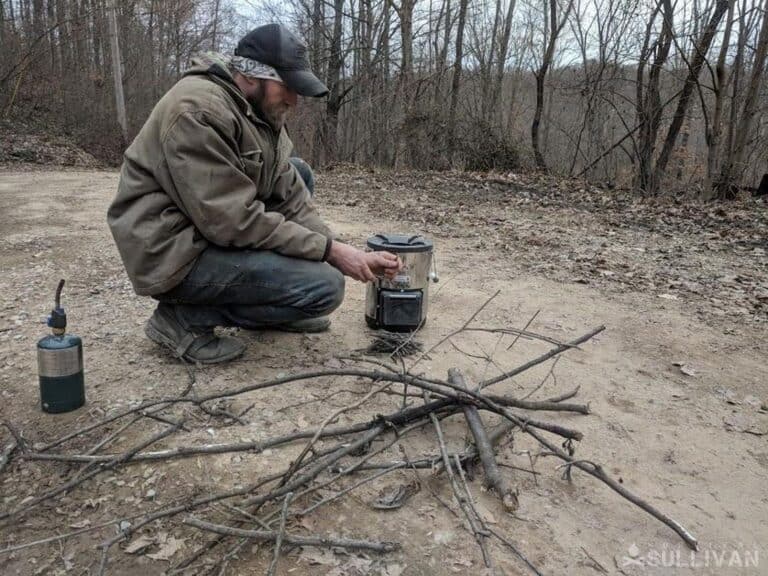
using a portable rocket stove in the woods
The result is a hotter, more efficient burn, even with minimal fuel. These stoves have the advantage of boiling water very quickly while making use of common natural fuel.
But, you can make your own rocket stove with multiple holes dug into the ground, offering the same benefits and a versatile approach to outdoor cooking and boiling.
If you’re looking for a speedy, fuel-economical solution, the rocket stove could be your answer.
6. Jetboil
When it comes to boiling water ASAP (or as my granddad used to say, “when you need it done yesterday!”), the Jetboil is the standout way to do it.
This specialized camp stove is designed for one task, boiling water, and it’s a task it excels at. In most cases, a Jetboil will get your water to a rapid boil in as little as 90 seconds.
Some models even offer precision temperature control for your specific needs and fuel economy.
However, like all such stoves Jetboils require a dedicated fuel source, which means carrying a little extra gear. Also, compared to common stoves, the Jetboil is significantly more expensive.
But for many, the speed, efficiency, and convenience that this stove offers make it worth the investment if you just need your stove to boil water.
7. Internal Flame Kettle
Internal flame kettles are a fairly unique piece of camping gear designed specifically for field use, and a type that’s been around a while.
They feature a special chamber where the flame is built directly beneath the water compartment.
This allows you to use common fuel for boiling water without the need for building a dedicated campfire, making them highly practical and efficient.
The downside, however, is that these kettles can be heavy and bulky contraptions, and are a pain to carry.
Despite this, their functionality and convenience make them a solid choice for those who prefer a more traditional, yet effective method of boiling water while camping.
[TAG5]
8. Electric Camping Kettle
For those who enjoy the comforts of modern conveniences even while camping, an electric camping kettle might be the perfect fit.
Long the calling card of the “glamper,” these devices are extremely easy to use and offer the convenience of quick, efficient boiling.
Just plug and play, literally! However, they do, of course, require a significant amount of electricity. Accordingly, they are best suited for RV camping or campsites where electrical hookups are available.
A generator is another option if you’re making use of one, and you could potentially run one off of a sizeable power bank with a solar charger.
But these things are such power hogs that is likely not the best use of your resources.
Despite being electrically dependent, the speed at which these kettles can boil water makes them a popular choice for many campers who can employ them, especially those who appreciate a quick and easy cup of coffee or tea in the great outdoors.
[TAG6]
9. 12V Kettle
A 12V kettle is an excellent companion for car campers, offering the convenience and efficiency of a standard electric kettle above with the ability make use of your vehicle’s power ports.
These kettles are designed to plug into your vehicle’s 12V power outlet. This allows you to enjoy hot beverages or easy instant meals (ones that need boiling water) without the need for a traditional campfire or stove.
One of the primary advantages of a 12V kettle, like the other electric kettle above, is its sheer ease of use. Simply fill it with water, plug it in, and wait for it to boil.
This makes it a super handy tool for those early mornings in the wilderness when you’re craving a hot cup of coffee or tea, or for those chilly nights when a warm meal can make all the difference.
However, while a 12V kettle can certainly be beneficial, it’s not without its significant drawbacks: One of the most notable disadvantages is that it relies heavily on your vehicle’s battery.
If your battery runs down, the kettle becomes useless. Worse, repeated use of the kettle can drain the battery over time, which could potentially leave you stranded in the great outdoors! This is especially likely with a weak, small, or old battery.
Therefore, it’s important to monitor your battery levels closely when using this kettle and to have a backup power source available.
[TAG7]
10. Solar Kettle
For those seeking another off-grid and eco-friendly option, a solar kettle could be the perfect fit. As the name suggests, a solar kettle allows you to boil water for cooking or making hot beverage using the power of the sun.
The main advantage of a solar kettle is shared with the solar oven up above: independence from traditional power and fuel sources.
This means you don’t have to worry about running out of or carrying fuel, gathering wood or draining your vehicle’s battery.
In ideal conditions, a solar kettle also offers the convenience of a standard camping kettle.
But in less than ideal conditions, it is a non-starter: it’s basically useless at night, under a dense canopy of leaves, or on very cloudy days when there’s not enough sunlight to heat the water.
These are highly limiting drawbacks, especially if you’re camping in a heavily forested area or during a time of year (or place) when sunny days are few and far between.
Therefore, while a solar kettle can be a great addition to your camping gear, it is a niche option. You had better have a backup plan for those times when the sun isn’t shining.
[TAG8]
11. Ration Heater
The ration heater, also called a flameless ration heater, is a water- or air-activated heater packet commonly found in MREs.
These are compact and practical solutions for folks who need to heat small quantities of water. Its primary function is to provide a heat source for heating food packets, but they get just hot enough to almost boil water.
This type of heater is designed for simplicity and efficiency: small, thin, lightweight and easy to pack, they are a convenient addition to your camping gear.
Ration heaters operate without the need for electricity or traditional fuels – they only need a bit of water themselves! – and they are a reliable option in situations where resources might be scarce, or when you just don’t have time for anything else.
But do note that its water boiling capacity is extremely limited: you’ll need multiple heaters to significantly heat any sizeable quantity of water.
While it’s adequate for cooking packaged MRE entrees and beverages, it might not meet your needs if you require larger quantities of boiling water.
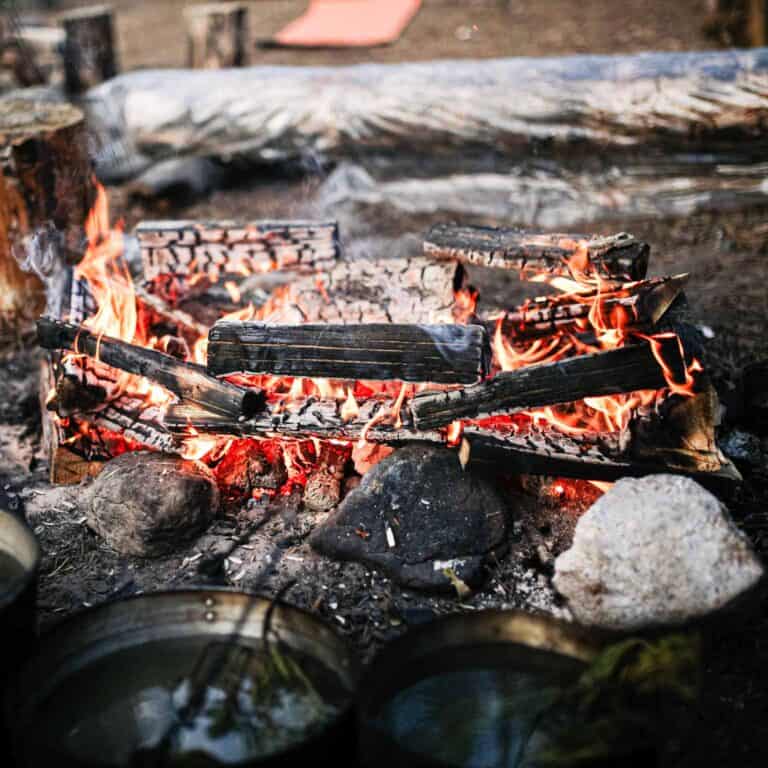
12. Hot Rocks
The hot rock method is an ancient technique that continues to prove its effectiveness even today, and it’s exactly what it sounds like: heating rocks to very high temperatures using a campfire (or any other source of intense heat), then dropping them into a suitable container of water.
The result is almost instant boiling water, making this method a quick and efficient way to boil water without the need for intricate tools or other equipment.
One of the benefits of the hot rocks method is its versatility. It can be used with a variety of containers, from modern metal pots to primitive containers made from leaves or other natural materials.
This makes it a supremely handy survival skill to have, especially if you find yourself in a situation where traditional boiling methods aren’t available.
However, this method does come with significant risks. Handling hot rocks can be very dangerous, as they can cause severe burns or start fires if not handled properly.
Additionally, heating damp or wet rocks can cause them to explode, which can lead to serious injuries to people nearby.
Therefore, this should be used with extreme caution and only when you’re skilled in handling hot rocks safely.
Despite these risks, this method remains a viable option for boiling water in the great outdoors and is a survival and sustainment skill that every, single camper needs in their repertoire.
Just remember to always prioritize safety when trying it!
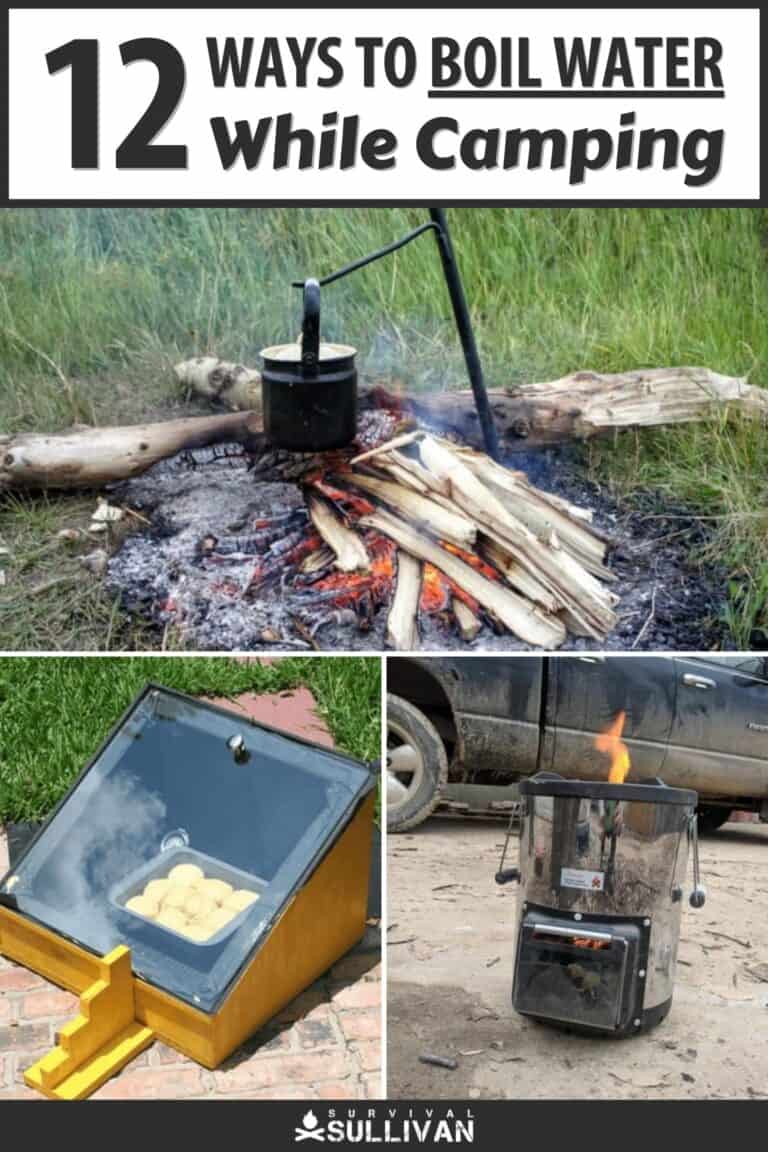
Thanks for your feedback!
The post 12 Easy Ways to Boil Water While Camping appeared first on Survival Sullivan.
By: Tom Marlowe
Title: 12 Easy Ways to Boil Water While Camping
Sourced From: www.survivalsullivan.com/boil-water-camping/
Published Date: Wed, 13 Sep 2023 16:00:00 +0000
------------------------
Did you miss our previous article...
https://bushcrafttips.com/bushcraft-news/fugitive-on-the-run-the-importance-of-security-and-survival-training
 What is BushcraftSurvival SkillsToolsVideosBushcraft CampsBushcraft KitsBushcraft ProjectsPrivacy PolicyTerms And Conditions
What is BushcraftSurvival SkillsToolsVideosBushcraft CampsBushcraft KitsBushcraft ProjectsPrivacy PolicyTerms And Conditions
